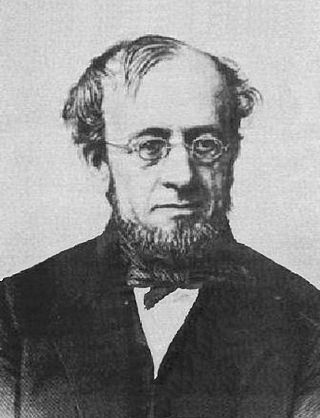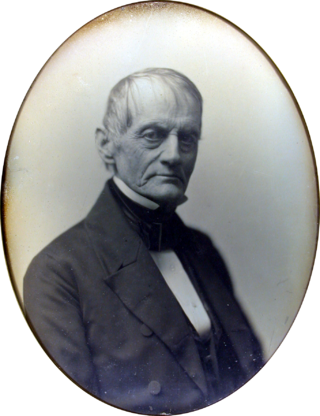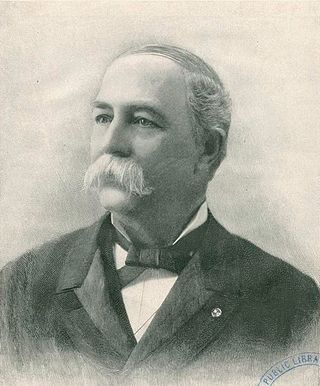Related Research Articles

Hannibal Hamlin was an American attorney and politician who served as the 15th vice president of the United States from 1861 to 1865, during President Abraham Lincoln's first term. He was the first Republican vice president.

Robert Charles Winthrop was an American lawyer, philanthropist, and Whig Party politician who represented Massachusetts in the United States House and Senate from 1840 to 1851. He served as the 18th Speaker of the United States House of Representatives and was a political ally and colleague of Daniel Webster. After a rapid rise in Massachusetts and national politics and one term as speaker, Winthrop succeeded Webster in the Senate. His re-election campaign resulted in a long, sharply contested defeat by Charles Sumner. He ran for Governor of Massachusetts in 1851 but lost due to the state's majority requirement, marking the end of his political career and signaling the decline of the Massachusetts Whig Party.

The Boston Brahmins, or Boston elite, are members of Boston's historic upper class. From the late 19th century through the mid-20th century, they were often associated with a cultivated New England accent, Harvard University, Anglicanism, and traditional British-American customs and clothing. Descendants of the earliest English colonists are typically considered to be the most representative of the Boston Brahmins. They are considered White Anglo-Saxon Protestants (WASPs).

Edward Clarke Cabot was an American architect and artist.

Israel Washburn Jr. was a United States political figure who was the Governor of Maine from 1861 to 1863. Originally a member of the Whig Party, he later became a founding member of the Republican Party. In 1842, Washburn served in the Maine House of Representatives.

Elisha Hunt Allen was an American congressman, lawyer and diplomat, and judge and diplomat for the Kingdom of Hawaii.

Dudley Sanford Gregory was the first Mayor of Jersey City, New Jersey, and was elected as a Whig to represent New Jersey's 5th congressional district in the United States House of Representatives from 1847 to 1849.

John Edward Bouligny was an American politician who was a member of the U.S. House of Representatives representing the state of Louisiana. He served one term as a member of the Know Nothing movement's anti-immigrant American Party. During his term, Louisiana seceded from the Union, but Bouligny remained in Washington and refused to resign. He was the only member of Congress from Louisiana to not resign or vacate his seat after the state seceded.

Charles Slaughter Morehead was a U.S. Representative from Kentucky, and served as the 20th Governor of Kentucky. Though a member of the Whig Party for most of his political service, he joined the Know Nothing, or American, Party in 1855, and was the only governor of Kentucky ever elected from that party.

William Appleton was an American businessman and politician from Massachusetts. He was a trader, shipowner, and banker, and served as a U.S. representative from Massachusetts from 1851 to 1855, and again from 1861 to 1862.

Adam Lewis "A.L." Bingaman was an American politician. He held the top offices of both houses of the Mississippi Legislature: was the President of the Mississippi State Senate from 1838 to 1840, and the Speaker of the Mississippi House of Representatives from 1834 to 1836.

Cyrus Hamlin was an attorney, politician, and a general from Bangor, Maine, who served in the Union Army during the American Civil War.

Charles Addison Boutelle was an American seaman, shipmaster, naval officer, Civil War veteran, newspaper editor, publisher, conservative Republican politician, and nine-term Representative to the U.S. Congress from the 4th Congressional District of Maine. He remains the second longest-serving U.S. Representative from Maine, the first being his colleague Thomas Brackett Reed.

Edward Austin Kent was a prominent architect in Buffalo, New York. He died in the sinking of the RMS Titanic and was seen helping women and children into the lifeboats.
Charles Adams Stott was a Massachusetts businessman who served in the Massachusetts House of Representatives; and as a member of the Common Council, Board of Aldermen, and the twenty-fourth mayor of Lowell, Massachusetts.
The Walter and Eva Burgess Farm was a historic farm at 257 Shaw Road in the rural southwestern part of Dover-Foxcroft, Maine known as Macomber Corner. The main farmstead, including a house and barn, were built in 1914 after the 19th-century farmstead was destroyed by fire. The property represented a virtually intact and well-preserved early 20th-century farmstead of rural Maine, and was stylistically distinctive because not very much new farm construction took place at that time in the state. The farm was listed on the National Register of Historic Places in 1997. This farmstead, including the historic house and barn, was destroyed by fire in 2013. It was removed from the National Register in 2015.

The 1851–52 Massachusetts gubernatorial election consisted of an initial popular vote held on November 10, 1851, followed by a legislative vote conducted on January 12, 1852. Incumbent Democrat Governor George S. Boutwell was reelected to a second term in office. The ultimate task of electing the governor had been placed before the Massachusetts General Court because no candidate received the majority of the vote required for a candidate to be elected through the popular election.
References
- ↑ "Hon. Charles W. Lowell dead". The Donaldsonville Chief. 10 November 1877. p. 2. Retrieved 18 July 2021.

- 1 2 3 4 5 6 7 "Charles W. Lowell Papers, 1860-1867". www2.hsp.org.
- ↑ "Charles W. Lowell admitted to the bar". Bangor Daily Whig and Courier. 12 January 1860. p. 2. Retrieved 18 July 2021.

- ↑ "Maine Appointments: Charles W. Lowell". Bangor Daily Whig and Courier. 23 February 1863. p. 2. Retrieved 18 July 2021.

- ↑ "Captain and Honorable Charles Winthrop LOWELL b. 20 Nov 1834 Farmington, Franklin, Maine, USA d. 5 Oct 1877 Dover-Foxcroft, Piscataquis, Maine, USA: Lowell and Block Genealogy and Social History". www.connectedbloodlines.com.
- ↑ "The House". The Times-Picayune. 2 July 1868. p. 2. Retrieved 18 July 2021.

- ↑ "Laws for the Government of the District of Louisiana Passed by the Governor and Judges of the Indiana Territory". Stout. April 19, 1873 – via Google Books.
- 1 2 Grant), United States President (1869-1877 (April 19, 1873). "Condition of Affairs in Louisiana: Message from the President of the United States, in Answer to a Resolution of the House, of December 16 Lase, Relative to the Condition of Affairs in Louisiana" – via Google Books.
{{cite web}}: CS1 maint: numeric names: authors list (link) - ↑ "Hon. Charles W. Lowell left for New England". New Orleans Republican. 19 May 1877. p. 1. Retrieved 18 July 2021.

- ↑ "Obituary for Charles W. Lowell". Boston Evening Transcript. 9 October 1877. p. 5. Retrieved 18 July 2021.
